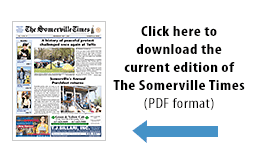(The opinions and views expressed in the commentaries and letters to the Editor of The Somerville Times belong solely to the authors and do not reflect the views or opinions of The Somerville Times, its staff or publishers)
Clinical trials for COVID-19 using placebos raise an ethical issue. In a pandemic with thousands dying, the conventional trial method of a double-blind study in which the identity of those receiving treatment versus a placebo is concealed from both patient and administrator does not make sense. Ethically, in a pandemic where the virus claims lives at a staggering rate, can we give a person a placebo knowing that they are not protected and could die or suffer permanent severe organ damage.
The purpose of a double-blind study is to minimize bias. However, the test for whether someone has contracted the virus is a yes/no, absolute answer. Bias does not influence the result of this test. Additionally, if test participants contract the virus and present at the emergency department, concealing the knowledge from the treating physician of whether the patient has received a vaccination or a placebo seems unreasonable. Covid-19 vaccine trials are not on which pill is better but on whether a vaccine actually works.
Science demands that the results of a trial show a statistical outcome to justify the vaccine; this is why the double-blind paradigm makes sense in conventional wisdom. But we have another route that could be followed that would not put the lives of the population at risk but deliver a result couched in scientific method without the ethical dilemma. There are numerous “hot spots” in various communities where the virus is raging. We have a wealth of data indicating infection rates, hospitalization rates, deaths, and total cases in communities already.
Instead of the double-blind trials, why not identify several of these “hot spot” communities, vaccinate a statistically significant proportion of the population and observe the results. Before vaccination, you would double test candidates. Once their negative status is confirmed, the study can track their propensity to contract the virus in the hot spots and tabulate the results statistically.
This can be done without putting any part of the trial population at risk of contracting the virus resulting from a placebo which would not be helpful. This can be a statistically sound procedure to circumvent the ethical issue and to get the results needed to prove efficacy. Where I live in Massachusetts, we have hot spots in the inner Boston urban areas of Chelsea, Revere, Lynn and some other suburbs. Any or all of these could provide a solid platform from which this could be implemented.
Physicians swear an oath the “first do no harm” and by eliminating the double-blind test methodology, that can be achieved. We should move with haste because we have these “hot spots” of outbreak and use these communities to the advantage of proving a vaccine. Some may feel side effects, yes, but they will not die from the virus. It is time for being practical to get the statistical / scientific data to verify outcomes.
— Alan Bingham
Somerville












Alan,
Your presumption is wrong: “The purpose of a double-blind study is to minimize bias. However, the test for whether someone has contracted the virus is a yes/no, absolute answer.” This is not the case.
While it is true that it also minimized bias, the purpose is primarily to make the results more interpretable from a statistical perspective, generating clear results rather than a lot of “we don’t knows”.
All trials have a clear yes/no answer, called the primary endpoint. There may be additional endpoints that they are exploring (e.g., secondary things to measure), but the primary endpoint is the main thesis in the question of whether X drug impacts Y, and Y is always a very specific medical measure and not a general question of “does it work”.
Finally, there are many trials that have the same ethical dilemma that you raise. Think about all the oncology / cancer trials out there. For many it’s a last-hope effort to get into a trial, and there is STILL a chance of receiving placebo.